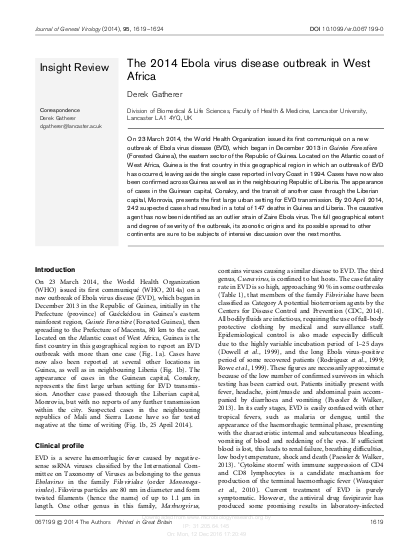
On 23 March 2014, the World Health Organization issued its first communique´ on a new outbreak of Ebola virus disease (EVD), which began in December 2013 in Guine´e Forestie`re (Forested Guinea), the eastern sector of the Republic of Guinea. Located on the Atlantic coast of West Africa, Guinea is the first country in this geographical region in which an outbreak of EVD has occurred, leaving aside the single case reported in Ivory Coast in 1994. Cases have now also been confirmed across Guinea as well as in the neighbouring Republic of Liberia. The appearance of cases in the Guinean capital, Conakry, and the transit of another case through the Liberian capital, Monrovia, presents the first large urban setting for EVD transmission. By 20 April 2014, 242 suspected cases had resulted in a total of 147 deaths in Guinea and Liberia. The causative agent has now been identified as an outlier strain of Zaire Ebola virus. The full geographical extent and degree of severity of the outbreak, its zoonotic origins and its possible spread to other continents are sure to be subjects of intensive discussion over the next months.
Links
Resource collections
- COVID-19 Response Collection
- Learning from crises
- UN Habitat - Urban Response Collection
- Urban Response - Urban Crisis Preparedness and Risk Reduction
- Urban Response Collection - Community Engagement and Social Cohesion
- Urban Response Collection - Economic Recovery
- Urban Response Collection - Environment and Climate Change
- Urban Response Collection - Housing, Land and Property
- Urban Response Collection - Urban Crisis Response, Recovery and Reconstruction
- Urban Response Collection - Urban Resilience